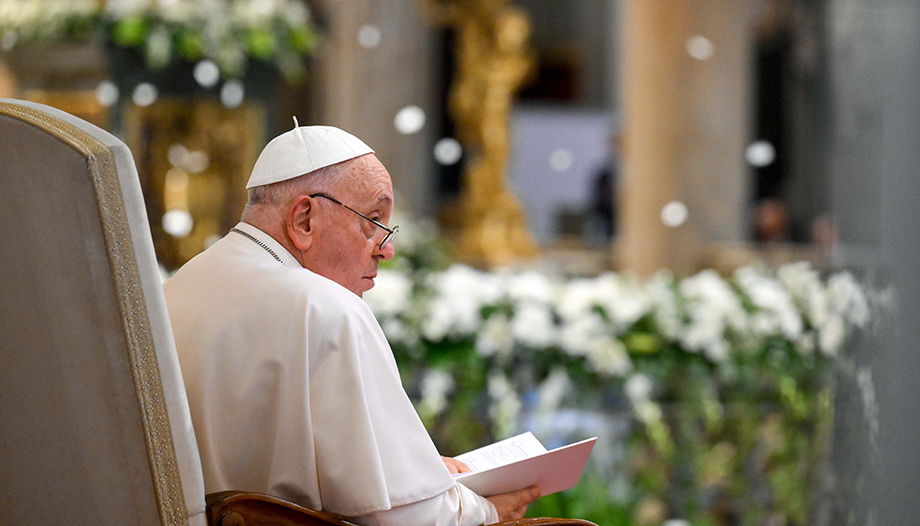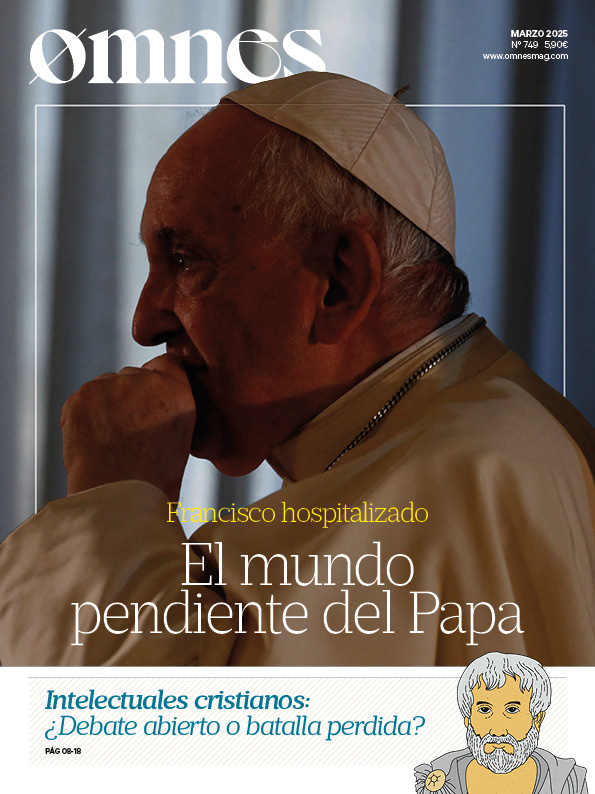What pastoral interest can literature (novels, poems) have in personal formation and evangelization, precisely in our culture of images and screens?
Pope Francis has written a Letter on the role of literature in education (17-VII-2024): in the maturation of every person, in the formation of Christians and also concretely in priestly formation.
Literature and personal maturity
In his letter, the Pope joins so many figures of all times who have drawn attention to this means of enriching formation, which we have at our disposal, and which, for various reasons, today is in danger of being put aside, with the consequent impoverishment, in the face of a certain obsession with screens.. Compared to audiovisual media and their characteristics, those who read a book, Francisco points out, are much more active.. The reader intervenes in the work he/she reads and in a certain sense rewrites it.
"In a way he rewrites the play, he expands it with his imagination, he creates his world, he uses his skills, his memory, his dreams, his own story full of drama and symbolism, and in this way what results is a play very different from the one the author intended to write".
Hence, the literary text, as happens in general with any text, whether written or audiovisual, has a life of its own that engenders other original "living texts" in those who read it: "...".A literary work is, therefore, a living and ever-fertile text, capable of speaking in many ways and of producing an original synthesis in each reader who encounters it.". And this enriches the reader not only in a passive sense, but insofar as he opens his person to the world and enters into dialogue with it, enlarging his personal world.
"By readingwrites the Pope, the reader is enriched by what he receives from the author, but this allows him at the same time to bring out the richness of his own person, so that each new work he reads renews and expands his personal universe.".
Francisco proposes, in this regard, "a radical change"specifically "about the attention that should be given to literature in the context of the formation of candidates for the priesthood"..
Why, one might ask, is the Pope so interested now? A first answer, anthropological, is that "literature has to do, in one way or another, with what each of us seeks in life, since it is intimately related to our concrete existence, with its essential tensions, desires and meanings.".
Francisco recalls his experiences in the mid-sixties, as a young literature professor who encouraged his students to find those readings in which their own dramas and experiences resonated. There is much interesting advice and detail in this letter, for example in choosing what to read.
"We must select our readings with availability, surprise, flexibility, allowing ourselves to be advised, but also with sincerity, trying to find what we need at each moment of our life.".
From the point of view of usefulness, personal spiritual and moral discernment and contemplation, it is worth reading carefully nos. 16-20, 26-40 of the letter. In these passages, the Pope uses various metaphors, the telescope, the gymnasium, the act of digestion, to show how literature is an excellent instrument for personal understanding of the world, for understanding and experiencing the sense that others give to their lives, for seeing reality with your and not only with their own eyes.
Thus, literature is a school of the gaze and of "ecstasy" (going out of oneself), of solidarity, tolerance and understanding. This is so, the successor of Peter thinks, because "being Christians, nothing that is human is indifferent to us".
A school of patience, humility and understanding, "the literary gaze trains the reader in decentralization, in the sense of limit, in the renunciation of dominance, cognitive and critical, in experience, teaching him a poverty that is a source of extraordinary richness.".
The reader welcomes the duty of judgment, not as an instrument of domination, "but as an impulse towards incessant listening and as a readiness to put oneself at stake in that extraordinary richness of history due to the presence of the Spirit, which is also given as grace; that is, as an unforeseeable and incomprehensible event that does not depend on human action, but redefines the human being as a hope of salvation.".
For the evangelical discernment of cultures
After the introduction, Francis points out the interest that reading has for believers, as a way to know the cultures (their own and others) and thus be able to speak to the hearts of men (in this regard, it would suffice to recall the volumes by Charles Moeller, "The reading of the Bible", and "The reading of the Bible")., 20th Century Literature and Christianity). For no culture isolated in itself can exhaust the message of the Gospel (cf. apostolic exhortation Evangelii gaudium 117).
At this point the Pope looks at one aspect of the current situation: "Many of the doomsday prophecies that today try to sow despair have their origin precisely in this aspect.". Therefore, "contact with different literary and grammatical styles will always allow us to deepen our understanding of the polyphony of Revelation."without reducing or impoverishing it to the extent of one's own historical needs or mental structures.
In fact, the Fathers of the Church, such as St. Basil of Caesarea (cf. Speech to the youth), extolled the beauty of classical literature even pagan, and advised to know it, both in relation to the arguments (philosophy and theology), and in relation to behaviors (asceticism and morals). "Precisely"the Bishop of Rome observes, "from this encounter between the Christian event and the culture of the time, an original reworking of the Gospel proclamation emerged.".
For this reason, and as the case of St. Paul and his presence in the Areopagus of Athens testifies (cf. Acts 17:16-34), literature is a good tool for the "evangelical discernment of culture". That is, for "to recognize the presence of the Spirit in the multifaceted human reality"and for "to grasp the seed already planted of the Spirit's presence in the events, sensitivities, desires and deep tensions of hearts and social, cultural and spiritual contexts".
In this way, literature is shown as "a 'gateway' that helps the pastor to enter into a deep dialogue with the culture of his time.".
The Pope picks up on another observation about the current religious context: "The return to the sacred and the spiritual quests that characterize our times are ambiguous phenomena. More than atheism, today we are challenged to respond adequately to the thirst for God of many people, so that they do not seek to quench it in alienating proposals or in a fleshless Jesus Christ." (cfr. Evangelii gaudium, 89).
Touching the heart of the contemporary human being
This is a consequence of the Incarnation of the Son of God: "That flesh made of passions, emotions, feelings, concrete stories, hands that touch and heal, looks that liberate and encourage; of hospitality, forgiveness, indignation, courage, daring. In a word, of love".
Hence, through literature, priests and in general all evangelizers can become more sensitive to the full humanity of Jesus, so that they can better proclaim him. For when the Second Vatican Council states that "In reality, the mystery of man is only clarified in the mystery of the Incarnate Word". (Gaudium et Spes22), Francisco points out, "it is not an abstract reality, but the mystery of this concrete human being, with all the wounds, desires, memories and hopes of his life.".
That's what it's all about: "This is the point: the task of believers, and in particular of priests, is precisely to 'touch' the heart of contemporary human beings so that they are moved and open to the proclamation of the Lord Jesus and, in this effort, the contribution that literature and poetry can offer is of unparalleled value.".
In a parenthesis, one might think, as one reads this letter of the Pope, that what is lacking in our contemporaries is above all faith and "doctrine"; that is, knowledge of the Christian truth about God, Jesus Christ, the sacraments and morals. Certainly, it will be necessary to discern the needs of each culture. But in general this judgment is at least insufficient.
As T. S. Elliot says and as the Pope reflects, the modern religious crisis brings with it a generalized "emotional incapacity". Francis points out: "In the light of this reading of reality, the problem of faith today is not primarily that of believing more or believing less in doctrinal propositions. It is rather related to the incapacity of many to be moved before God, before his creation, before other human beings. Here, therefore, is the task of healing and enriching our sensibility.".
In the final part of his letter, Francis insists on pointing out why it is important to consider and promote the reading of great literary works as an important element of education. paideia priestly, which could be equivalent, for evangelizers in general, to education in the faith. And, attention, as we have already seen, he will say that it is not only a matter of touching the hearts of others, but of changing one's own heart, the heart of the evangelizer's pastor, in the image of the heart of Christ.
Self-education of the evangelizer
This self-education of the evangelizer can be broken down into four directions that the letter points out in conclusion. And it is worthwhile to collect them at length.
1) "I trust, writes Francis, "in having shown, in these brief reflections, the role that literature can play in educating the heart and mind of the pastor or future pastor in the direction of a free and humble exercise of one's own rationality, of a fruitful recognition of the pluralism of human languages, of an extension of one's own human sensitivity and, in conclusion, of a great spiritual openness to listen to the Voice through many voices.".
2) "In this sense" -he goes on to point out- "literature helps the reader to destroy the idols of self-referential, falsely self-sufficient, statically conventional languages, which sometimes run the risk of contaminating the ecclesial discourse as well, imprisoning the freedom of the Word.".
3) "The spiritual power of literature evokes [...] the primordial task entrusted to man by God, the task of 'naming' beings and things (cf. Gen 2:19-20). The mission of guardianship of creation, assigned by God to Adam, is first of all the recognition of one's own reality and of the meaning of the existence of other beings.".
4) "In this way, the affinity between the priest - and by extension, all those who participate in the evangelizing mission of the Church, that is, all Christians, called to be missionary disciples - and the poet is manifested in this mysterious and indissoluble sacramental union between the divine Word and the human word, giving life to a ministry that becomes a full service of listening and compassion, to a charism that becomes a responsibility, to a vision of truth and goodness that open up as beauty.".
Indeed, literature can be today a master path for the self-education of one's own personality, a purification of the evangelizing language, a help to recognize and care for reality; and, thus, also a channel to better incarnate the evangelizing mission.








